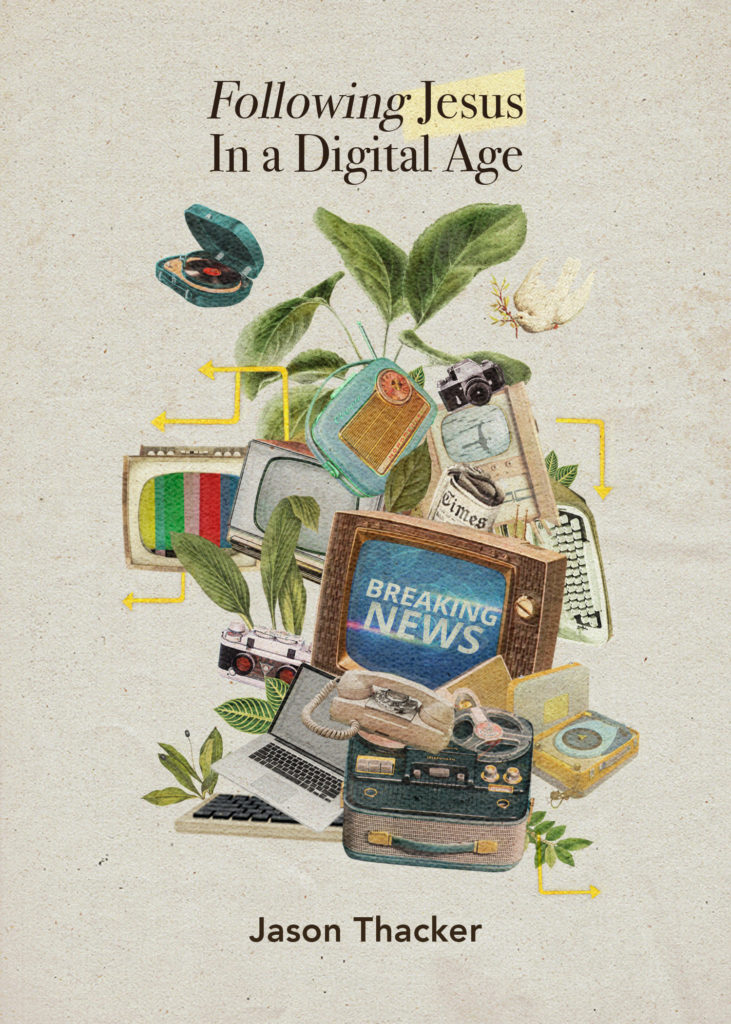
What does it mean to follow Jesus in a digital age is a question many people ask themselves, but there are not many resources to date that help answer this question. Jason Thacker, who is the chair of Research in Technology at the ERLC Research Institute, has filled this void by writing this book. According to Thacker the main goal is “to [help] better understand that we are each being discipled every day by the technologies we use, whether we realize it or not” (3) and by making us think how we can navigate our digital society in a “moral, holistic, and deeply biblical way” (6). The book that comes in a handy takeaway size, contains four thematic chapters about wisdom, truth, responsibility, and identity and an appendix that contains a note to (church) leaders.
The first chapter explores the question what it means to follow Jesus wisely in a digital age. Wisdom starts with taking a step back to reflect on how technology is shaping us in our daily lives and Thacker draws on the work of the French sociologist and theologian Jacques Ellul to demonstrate how humans and technology have been in a complex relationship since the beginning of the world. The mindset in our 21st century society is that we should be able to solve every world problem with technology (‘there’s an app for that’) and technology has permeated almost every aspect of our daily lives. In a way our world, and henceforth our worldview, gets more and more mediated through technology. Ellul already wrote about this technological imperative in the pursuit of efficiency and progress in his book The Technological Society more than seventy years ago and his analysis still holds today. In the last part of this chapter Thacker describes what it means to be wise as it is described in the biblical Wisdom literature. Being wise is not to walk the path of technology towards more efficiency, but to reorient oneself to a full flourishing life as God intended it to be. Christians are all called to show wisdom in the digital public square. The second chapter is about pursuing truth. According to Thacker the root cause of the current post-truth era is not technology, but the scientific worldview that moved transcendency out of our society; we have moved from a God-centric world to a self-centred world where truth has been personalized and weaponized as propaganda. This has led to a world that gets inundated with dis- and misinformation which has been amplified and accelerated by technology. With the advent of new AI-powered technologies like deepfakes it is only expected to get worse as Thacker expects. He calls upon Christians to act wisely and pursue the Truth and be accountable for one’s own behaviour in dealing with mis- and disinformation. Being responsible in a curated age is the theme of the third chapter where the author advocates for being mindful of what content is being presented to you and why. In what I consider to be one of the best sections of the book, Thacker explains the rationale of content moderation by big tech companies and how they often fail to account for minority views which clearly can impact expressing Christian values that deviate from society’s values. In the last part of the book Thacker argues that Christians should take personal responsibility for their actions and not blaming technology or the other when things get polarized. One of the root causes for this polarization is the pursuit for building (online) identities by identifying us with (digital) communities that give a sense of belonging, purpose, and safety; Thacker challenges Christians to take the long Biblical view as they already have a place where they belong.
Reading this book may give the reader an uncanny, even dystopian view on the role technology is playing in our society, despite the author mentioning positive use cases of technology. Christians may also be thankful for the gift of technology in their lives, and I would have liked to have this point more emphasized in the book to develop a balanced and realistic point of view on technology. The best part of this book is the long biblical view the author takes on what it means to be a Christian in this digital world by drawing on biblical wisdom. This book will be helpful for any church leader, theologian and preacher who wants to develop a biblical perspective on our technological mediated age but I would recommend reading this book in parallel with a book that focuses more on how technology could be used for good so one can develop a realistic, well informed perspective on what it means ‘to be present in the modern, digital world’ to paraphrase Ellul.
Jason Thacker, Following Jesus in a Digital Age, (Nashville TN, B&H Publishing, 2022), 163 pp., USD 12.82, paperback (ISBN 978-1087754598).
